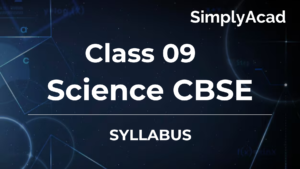Science CBSE Class 9 Syllabus
CBSE syllabus for class 9 Science 2024-25
CBSE syllabus for class 9 Science for session 2024-25 is mentioned below. Science is an extremely important subject for Class 9 students as it forms the base of the advanced chapter waiting to be uncovered in the senior classes. The chapters are created by looking at several parameters of learning and the use of different concepts in our life. Students must look at their syllabus to understand its main purpose. SimplyAcad has listed the chapters presented in the ncert science class 9 book to help students learn all the details required.
NCERT Science CBSE Class 9 Syllabus: Chapters 2024-25
| Science CBSE Class 9 Syllabus: CHAPTERS |
| Chapter 1 MATTER IN OUR SURROUNDINGS |
| Chapter 2 IS MATTER AROUND US PURE? |
| Chapter 3 ATOMS AND MOLECULES |
| Chapter 4 STRUCTURE OF THE ATOM |
| Chapter 5 THE FUNDAMENTAL UNIT OF LIFE |
| Chapter 6 TISSUES |
| Chapter 7 MOTION |
| Chapter 8 FORCE AND LAWS OF MOTION |
| Chapter 9 GRAVITATION |
| Chapter 10 WORK AND ENERGY |
| Chapter 11 SOUND |
| Chapter 12 IMPROVEMENT IN FOOD RESOURCES |
Overview of the CBSE syllabus for class 9 Science syllabus 2024-25
Chapter 1: Matter in Our Surrounding
Matter in Our Surrounding is the first chapter of the ncert class 9 science. The chapter defines matter as something which occupies space and has mass. It discusses how the Indian philosophers have classified matter into different elements as Panch Tatva, comprising air, water, sky, fire and earth. However, modern scientists classify matter into two types such as physical and chemical properties. The main topics discussed in the chapters are:
| Definition of matter |
| Solid, Liquid and Gas |
| Characteristics – Shape, Volume, Density |
| Change of state – Melting, Freezing, Evaporation, Condensation, Sublimation. |
Chapter 2: Is Matter Around Us Pure?
The second chapter of the ncert class 9 science book, Is Matter Around Us Pure, helps students learn about mixtures, solutions, and its properties, separation of mixtures followed by physical and chemical changes. Students also gain insights on Compounds and its properties, the difference between a compound and a mixture, etc. Let’s see what topics are some important topics covered:
| Nature of matter: Elements, compounds and mixtures |
| Heterogeneous Mixtures |
| Homogeneous Mixtures |
| Colloids and Suspensions |
| Physical and Chemical changes |
Chapter 3: Atoms and Molecules
Atoms and Molecules is the third chapter of the ncert class 9 science which deals with laws of chemical combination, atoms, molecules, etc. Students will learn to write chemical formulas, molecular mass and mole concepts. Some important topics covered here are:
| Particle nature and their basic units: Atoms and molecules |
| Law of Chemical Combination |
| Chemical formula of common compounds |
| Atomic and molecular masses |
Chapter 4: Structure of the Atom
Chapter 4 of the ncert class 9 science studies the structure of atoms, through various atomic models contributed by scientists around the world. The chapters talk about electrons, and its distribution in different orbits. Students will learn to calculate the valency, mass and atomic number. Here are some of the important topics covered:
| Structure of Atoms: Electrons, Protons and Neutrons |
| Valency |
| Atomic Number |
| Mass Number |
| Isotopes and Isobars |
Chapter 5: The Fundamental Unit of Life
The Fundamental Unit of Life is the fifth chapter of the ncert class 9 science exploring cell in length. The chapter is related to biology and mainly deals with the cell structure, organisation, plasma membrane, cell wall, cytoplasm and structure of an animal cell. Some of the important topics covered in this chapter are:
| Cell as a basic unit of life |
| Prokaryotic and Eukaryotic Cells |
| Multicellular Organisms |
| Cell membrane and Cell wall |
| Cell organelles and Cell inclusions |
| Chloroplast |
| Mitochondria |
| Vacuoles |
| Endoplasmic reticulum |
| Golgi apparatus |
| Nucleus |
| Chromosomes: basic structure, and number |
Chapter 6: Tissues
The sixth chapter of the ncert class 9 science revolves around tissues. The chapters focus on discussing the definition of tissues and its different types: plant and animal tissues. Some of the important topics covered here are:
| Organs and Organ System |
| Organism: Structure and functions of animal and plant tissues |
Chapter 7: Motion
Motion is the seventh chapter in the ncert class 9 science book revolving around the concepts of motions, speed and direction. Students will learn about graphical representation of motion, and solve numericals related to it. Some of the important topics are:
| Distance and displacement |
| Velocity |
| Uniform and non-uniform motion along a straight line |
| Acceleration |
| Distance-time and velocity-time graphs for both uniform motion and uniformly accelerated motion, |
| Elementary idea of uniform circular motion. |
Chapter 8: Force and Law of Motion
Force and Law of Motion is an extremely important chapter of the class 9 science syllabus and revolves around the three laws of motion. Students will learn about them with proper illustrated diagrams provided in the chapter. Some of the important topics covered are:
| Force and Newton’s laws: Force and Motion |
| Newton’s Laws of Motion |
| Action and Reaction forces |
| Inertia of a body |
| Inertia and mass |
| Momentum |
| Force |
| Acceleration |
Chapter 9: Gravitation
Gravitation is the ninth chapter of the ncert class 9 science syllabus, which discusses the universal law of gravitation and its related concepts. The chapter talks about the importance of gravitation, free fall, mass, thrust and pressure. It also presents the principles of Archimedes and relative density. Let’s look at some of the topics covered in the chapters:
| Universal Law of Gravitation |
| Force of Gravitation of the earth (gravity) |
| Acceleration due to Gravity |
| Mass and Weight |
| Free fall |
| Floatation: Thrust and Pressure |
| Archimedes’ Principle |
| Buoyancy |
Chapter 10: Work and Energy
Work and Energy is the tenth chapter in the list, which focuses on the concept of energy and its different forms. The chapter comprises various numerical problems for students to learn the formulas and ideas related to the topic. Some important sections in the chapter are as follows:
| Energy and Power: Work done by a Force |
| Kinetic and Potential energy |
| Law of conservation of energy |
Chapter 11: Sound
Sound is an essential chapter of the ncert class 9 syllabus, the chapter is related to physics. Students will learn about different concepts such as production of sound, propagation of sound, range of hearing, reflection of sound and human ear. These are important topics covered in the chapter:
| Nature of sound and its propagation in various media |
| Speed of sound |
| Range of hearing in humans |
| Ultrasound |
| Reflection of sound |
| Echo |
Chapter 12: Improvement in Food Resources
Improvement in Food Resources is the twelfth chapter of the ncert class 9 science, focusing on concepts related to improving the production of food resources to meet the requirements.
Some main highlights of the chapter are as follows:
| Crop yields |
| Manure and Fertiliser |
| Storage of grains |
| Animal husbandry |
| Agriculture, Farming and Dairy |
Science cbse class 9 syllabus Chapter-wise Mark Distribution 2024-25
| Chapter. No | Chapter Name | Marks |
| 1 | Matter in our Surroundings | 25 |
| 2 | Is Matter around us Pure? | |
| 3 | Atoms and Molecules | |
| 4 | Structure of Atoms | |
| 5 | The Fundamental unit of Life | 22 |
| 6 | Tissues | |
| 7 | Motion | 27 |
| 8 | Force and Laws of Motion | |
| 9 | Gravitation | |
| 10 | Work and Energy | |
| 11 | Sound | |
| 12 | Improvement in Food Resources | 6 |
| Total | 80 |
CBSE syllabus for class 9 Science Unit-Wise Weightage 2024-2025
The syllabus comprises four units the names of which along with the weightage assigned for the annual examination are as follows:
| Unit No. | Unit Name | Marks |
| I. | Matter – Its Nature and Behaviour | 25 |
| II. | Organisation in the living world | 22 |
| III. | Motion, force and work | 27 |
| IV. | Food, Food Production | 06 |
| Total Marks | 80 | |
Frequently asked questions on CBSE syllabus for class 9 Science
Q1. How many units have been prescribed in the science syllabus of class 9 for 2024-25?
Ans. The CBSE Class 9 Science Syllabus 2024-25 includes the 4 units. The four units covered in the CBSE Class 9 Science Syllabus 2024-25 are:
Matter- Its Nature and Behaviour; Organisation in the Living World, Motion, force and work; Food, Food Production.
Q2 Where can I download the ncert class 9 science syllabus for 2024?
Ans. Students can view the class 9 Science syllabus in the article above or visit the official website.
Q3 Which is the largest unit in terms of marks in class 9 science?
Ans. Motion, force and work is the largest unit in terms of marks, assigned a total of 27 marks. Students can see the above chart mentioned to learn the details of the weightage.
latest video
news via inbox
Nulla turp dis cursus. Integer liberos euismod pretium faucibua




